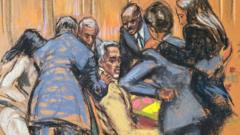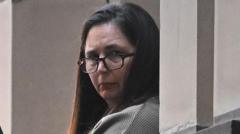After nearly two months of testimony, jurors now face the challenge of deciding the fate of Erin Patterson, accused of culpable negligence leading to three deaths.
Jury Begins Deliberations in High-Stakes Mushroom Murder Case in Australia

Jury Begins Deliberations in High-Stakes Mushroom Murder Case in Australia
The jury in the Erin Patterson trial has retired to determine the verdict in the case involving a deadly mushroom lunch.
The high-profile murder trial surrounding Erin Patterson, the 50-year-old Australian woman charged in connection with a fatal lunch that left three relatives dead, has seen the jury retire for deliberations after a lengthy period of evidence and witness accounts. Patterson stands accused of deliberately mixing toxic death cap mushrooms into a beef Wellington dish prepared for her in-laws and their family, an event that unfolded in Leongatha, Victoria, back in July 2023.
Facing three counts of murder and one count of attempted murder, Patterson has maintained her innocence. The prosecution alleges she knowingly incorporated the poisonous fungi into the meal, lying to police and disposing of incriminating evidence post-incident. They argue this deceit underscores her guilt, supported by the assertion that she had manipulated her relatives to attend the lunch under pretenses of a fabricated cancer diagnosis.
In contrast, Patterson's defence contends that she did not intentionally include the toxic mushrooms and that her panicked response after the crisis led her to lie. They argue that her close relationship with her in-laws negates any reason for malicious intent, emphasizing her lack of motive.
Throughout the trial, nearly 50 witnesses testified about the tragic event, which resulted in the deaths of Patterson’s in-laws, Don and Gail Patterson, aged 70, along with 66-year-old Heather Wilkinson. While healing and recovering in an induced coma, Heather's husband, local pastor Ian Wilkinson, also attended the infamous lunch but narrowly escaped the same fate, having canceled attendance at the last minute.
Justice Christopher Beale offered the jury closing directions, focusing on the evidence from both sides. Prosecutor Nanette Rogers argued that the premeditated nature of Patterson's actions indicated a need for conviction, stating, “She has told lies upon lies because she knew the truth would implicate her.”
On the other hand, defence attorney Colin Mandy described the prosecution’s theory as a convoluted puzzle lacking a unifying motive. He cautioned against convicting solely based on suspicion of dishonesty, reminding jurors to focus on the evidence presented rather than emotional responses.
As jurors now enter a period of supervised deliberation, they will be isolated from the outside, tasked solely with determining the outcome of a case that has captured national attention and raised complex questions about intention, culpability, and the often-tragic consequences of seemingly innocuous choices.





















